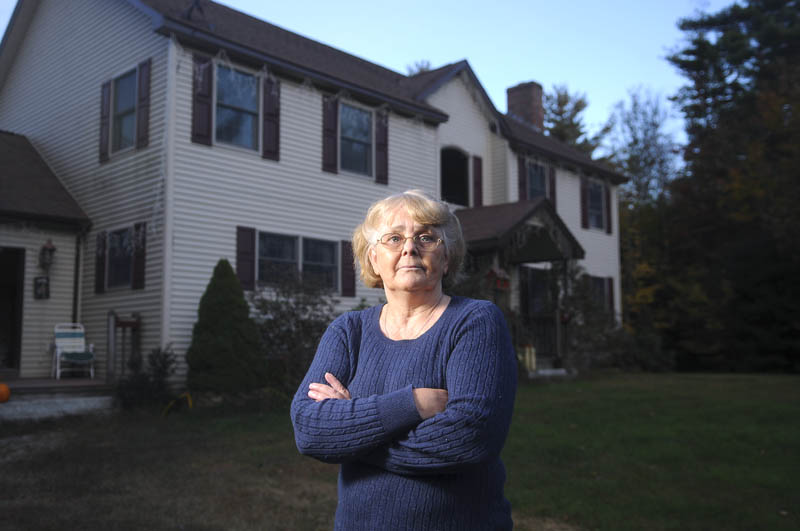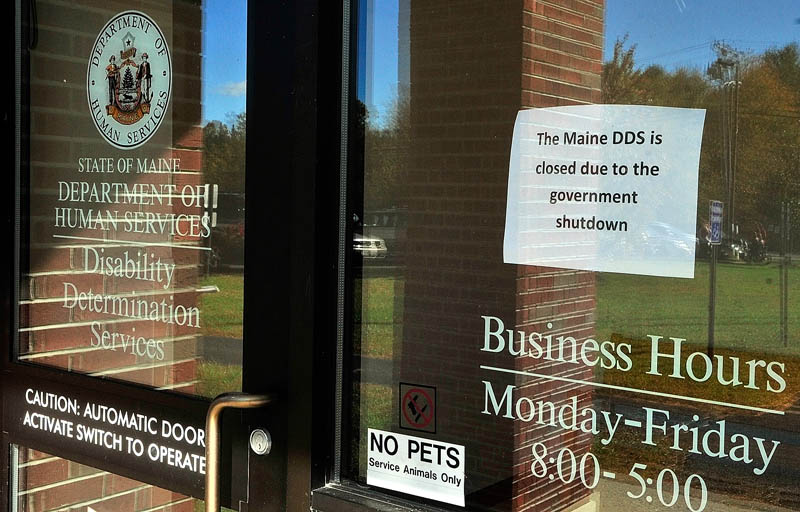Because of the federal shutdown, 52 state workers with federally funded salaries were told on Monday to take Tuesday, Wednesday and Thursday off and go back to work on Friday.
Robin Upton-Sukeforth of Litchfield, a disability claims adjudicator who works at the Disability Determination Services office in Winthrop, told a reporter on Thursday afternoon that she was ready to go back to work the next morning.
But minutes later, she called back.
She said a call had just come from a supervisor who told her not to go to work Friday or until further notice. Her co-worker Ronnette Partridge, also of Litchfield, reported getting the same message.
So did claims adjudicator Deb Thomas of Readfield, who vented frustration about Congress, where the Republican-led House of Representatives and the Democrat-led Senate are still at a stalemate on a solution to the shutdown, which began Oct. 1.
“I’m really mad,” Thomas said. “It’s just mind-boggling that they can have so little regard for the people they work for.”
Maine, along with Arizona, is one of at least two states to suspend service at the state-run Disability Determination Services offices, where federally funded workers vet disability claims for the Social Security Administration, making decisions on the validity of claims.
Rebecca Vallas, deputy director of government affairs for the National Organization of Social Security Claimants’ Representatives, a national advocacy group for disability attorneys, said more states will likely shutter their offices as October pay periods for workers pass.
“Our main concern is for people with significant disabilities and in many cases, terminal illnesses who have to already wait to get decisions,” Vallas said. “What this shutdown has done is to delay this already slow process for individuals who can’t afford to wait.”
Earlier this week, Steve O’Donnell, an Augusta disability attorney, said 50 cases of his are held up by the shutdown. He estimated there could be more than 1,000 statewide.
Gov. Paul LePage’s spokeswoman has defended his move to close the office as a necessary move in the absence of federal funding, but the director of Maine’s largest state employees’ union said it didn’t need to happen.
Because the workers draw federal salaries, the Social Security Administration told states in a letter in late September that it wouldn’t be able to provide their salaries in the event of a shutdown.
Instead, the federal government would reimburse states after the shutdown. The administration recommended continuing limited services at Disability Determination Services offices, but it left the decision to open or close offices to the states.
Adrienne Bennett, LePage’s spokeswoman, said the governor made the decision to close Maine’s office because “he doesn’t have the authority to appropriate dollars to fund the salaries of the federally funded employees.”
“Under the Constitution, it’s clear that he can’t do that,” she said.
But Chris Quint, executive director of the Maine State Employees’ Association, which represents workers in Winthrop, said with the federal government’s guarantee that the state would be reimbursed for disability workers’ salaries, the layoff wasn’t needed.
“They didn’t need to be laid off and the governor laid them off,” he said. “We’re at a loss for words.”
Thomas said the union has urged workers to file for unemployment, which she has done. LePage told reporters Thursday that his goal in declaring the shutdown a civil emergency is aimed at helping laid-off workers get benefits without having to seek re-employment, normally a condition of receiving benefits.
A large percentage of Mainers get disability benefits: In 2011, about 62,000 Mainers ages 18 to 64 received disability benefits — 7.4 percent of that state’s population that year, fifth-most in the nation behind West Virginia, Arkansas, Alabama and Mississippi.
Maine’s Disability Determination Service has also been seeing a high volume of claims lately, apparently.
Gordon Gates, a Saco-based disability attorney, wrote in his blog in July that Maine’s office had begun been getting help on claims from Vermont’s office because of a high workload. Thomas confirmed that.
The shutdown’s effect won’t stop cases from coming in, as claims can still be filed with the Social Security Administration, but it will cause a backlog of new cases and cases where decisions are already pending, experts say.
“We have cases assigned to us on a daily basis,” Thomas said. “If we’re not there, they can’t be assigned to us.”
Upton-Sukeforth said her office, being state-run but federally funded, is constantly in limbo in shutdown situations. Earlier this year, when a state shutdown was much talked about, they weren’t sure whether or not they would be out of work.
But in the office, she said many employees usually operate under the assumption that leaders won’t take them any farther than “the edge of the cliff.”
This time’s different.
“They jumped,” Upton-Sukeforth said. “Or they pushed us.”
Michael Shepherd — 370-7652
mshepherd@centralmaine.com
Send questions/comments to the editors.




Success. Please wait for the page to reload. If the page does not reload within 5 seconds, please refresh the page.
Enter your email and password to access comments.
Hi, to comment on stories you must . This profile is in addition to your subscription and website login.
Already have a commenting profile? .
Invalid username/password.
Please check your email to confirm and complete your registration.
Only subscribers are eligible to post comments. Please subscribe or login first for digital access. Here’s why.
Use the form below to reset your password. When you've submitted your account email, we will send an email with a reset code.